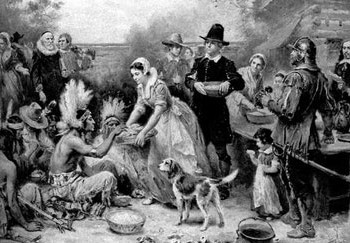Spread the Word, Not the Wealth
Communism, it is often said, will work under the proper conditions. Though it might fail in a big country with millions of disconnected  individuals, it should work in a small community of relatively close-knit comrades, who would thrive under a system of shared burden and harvest.
individuals, it should work in a small community of relatively close-knit comrades, who would thrive under a system of shared burden and harvest.
If you think that successful communism is small communism, the experience of America’s first settlers should dispel any romantic notions you may harbor on the subject.
Plymouth Colony, a small community of settlers struggling to survive in a new land, learned about the benefits of private property the hard way. When the colony began in 1621, all the goods and products were held in a “common stock.” All were to contribute equally and share equally in the community’s bounty—or lack thereof. The governor of Plymouth Colony, William Bradford, recorded the experiment of communal living in his journal. As he explains, there was little harvest and much dissatisfaction. Young men objected to working for the benefit of other men’s wives and children. The strong objected that they received the same amount of food and clothing as the weak. The older men objected to laboring the same amount as the young. The women objected to performing household chores for men other than their husbands, deeming it “a kind of slavery.”
In response to the dearth of crops, starvation, and overall miserable condition that communal living had produced, Bradford introduced a system of private property in agriculture. He assigned “to every family a parcel of land, according to the proportion of their number, for that end, only for present use (but made no division for inheritance) and ranged all boys and youth under some family.” This new system of private property proved prosperous and enlivening. Men, women, and children no longer thought labor to be tyrannical and oppressive, and instead became industrious stewards of their individual plots of land, resulting in bountiful harvests.
From Plymouth Colony’s transformation, Bradford concluded that communism was incompatible with human nature. It is vain to advocate that “taking away of property and bringing in community into a commonwealth would make [men] happy and flourishing. For this community (so far as it was) was found to breed much confusion and discontent and retard much employment that would have been to their benefit and comfort.”
It only took Plymouth Colony three years (and several bouts of starvation) to clarify that pilgrim socialism was a failure. Equality is not desirable when it means equally starving to death. This Thanksgiving, as we celebrate family, and friends, and the blessings of this life, let us also recall our other inheritance from the Pilgrims—that of private property.
![]() The above was graciously lifted from The Heritage Foundation.
The above was graciously lifted from The Heritage Foundation.
Audio file: The history of Thanksgiving.
![]()